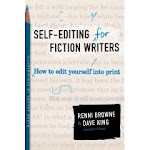***
 So you wanna be a writer when you grow up, huh? My first word of advice is don’t. Don’t become a writer. Not for money. Not for glory. Not for any reason other than that you have a passion in your gut that is so strong that nothing can prevent you from writing. Unless you have stories in you that you must tell, and writing them is as important to you as eating and sleeping and breathing. And sometimes more important.
So you wanna be a writer when you grow up, huh? My first word of advice is don’t. Don’t become a writer. Not for money. Not for glory. Not for any reason other than that you have a passion in your gut that is so strong that nothing can prevent you from writing. Unless you have stories in you that you must tell, and writing them is as important to you as eating and sleeping and breathing. And sometimes more important. With that out of the way, I assume you have passion. So, what do you do with this life of yours to pave your way to the writing world? Read. Observe. Write. Live. Those are the four main ingredients to preparing yourself to write.
Read everything you can get your hands on. Read classic literature, read literary fiction, read commercial fiction. Read books on the craft of writing. Read books on writers. Read dictionaries. Read cereal boxes. Just read.
Observe. If there is one attribute a writer must have (other than his passion to write), it is the ability to notice details. What is it about the way she walks that captures your attention? Is it her clothes? Her figure? Her wiggle? What words could you use to describe the preacher’s snorts between shouts? What do his eyes look like when he says “Hell”? What keeps his hair from falling into his eyes (or onto the floor)?
Look at your surroundings as though you’re showing them to someone who’s never been to your area. Notice the sounds you would hear if you listened. Notice the smells, the colors, the textures, everything you normally take for granted. Think of new ways to describe old things.
Write every day. It doesn’t matter if it’s a dozen words or a dozen pages, write. And don’t limit your writing to your passion—try writing poetry, fiction, journal entries, essays. Keep a journal or notebook with you at all times and jot your thoughts as you think them.
Live. Can you write about New York City if you’ve never been there? Probably—if you’ve seen enough movies and read enough descriptions, you could write with integrity about a city you’ve never seen. However, you would not be able to add new insight. For me, a small town girl, it was the vastness of the big city that took my breath away. And that most of the thousands of people all scurrying to some place would gladly pause a moment to give directions or advice.
Visit as many places as you possibly can, but also consider actually living in as many different types of places as you can. Yes, you can get superficial impressions of cultures during a seven-day vacation, but to truly understand a culture, you need to experience it more deeply. I’ve lived in small towns, large cities, suburbs, villages and deep in the country. I’ve lived in apartments, houses, complexes, dormitories, alone, with friends, with family. I’ve lived in Appalachia, the Midwest and the Deep South. And each of these has left an imprint (as well as an accent!).
Experience as many aspects of life as you can. Can you really understand the pain of heartbreak if you’ve never been loved and left? Can you understand the intensity of a mother’s (or father’s) love if you’ve never experienced it? Can you understand the thrill of surviving the bunny slope on down hill skis if you’ve never put your life at stake?
This isn’t to say you must become an alcoholic to understand alcoholism (although it does help :-)) or a bank robber to understand a thief. What it does mean is that writers need to take more chances than the average Joe, need to experience more of life in order to write more knowledgeably. It also means that writers must have empathy to understand people and situations beyond their personal experience.
What kind of job should you hold while waiting to publish? Well, many successful writers have had successful careers in business, law, medicine, education or any area you can think of before becoming published. So it doesn’t matter a lot what your “day” job is, just don’t go into debt. Live humbly and within your means, because once you sign that car loan, you are obligated to your 8-5 job.
Of course, some jobs will give you more “material” to incorporate into your writing than others. If you are just passing time, here are some suggestions:
• Work with people from diverse backgrounds, such as you can meet in airports, resorts, hotels and restaurants. These give you plenty of characters to draw from.
• Work physically. Manual work doesn’t occupy your mind. I do some of my best creative thinking while washing dishes by hand and mopping floors.
• Work where you have free time to write, such as night desk clerk, night guard at a business, bowling alley clerk (on the slow shift), car lot attendant, and so on.
I am fond of saying that there are two aspects to writing—the craft and the art. The craft is that which can be learned—grammar, using active voice, the basics of dialogue and so forth. The art is the God-given talent that a writer is either blessed with or isn’t. It is the ability to “see” the details in a setting and relay that in interesting, unique words to make the reader feel the location. It is the ability to understand human nature and empathize with even the most dastardly villain. If you have that talent, and if you have that passion to write no matter what the odds, you are a writer. And nobody can take that away from you.












Good advice, Sandy, and great post. Thanks!
ReplyDeleteGood advice and good lists. I think I would also add imagination to the list. Some people think it is easy to be a writer and say, "I've always thought about writing." However, that is one of the differences between being a writer and wanting to be a writer. You can't just think about it, you have to do it. . . and keep doing it. A quitter won't succeed.
ReplyDeleteWelcome to the Book Doctor, Sandy! Good advice about experiencing many diverse situations to give you fodder for writing. We all have our unique experiences that can make our writer richer.
ReplyDeleteThank you so much for having me. Whenever I drop by the Book Doctor, I'm impressed with the quality of the posts and the attractiveness of the design. So it's an honor to be a part of this group.
ReplyDeleteAnd thank you for the excellent comments. I'll update this article with your suggestions before using it again.
Many blessings to you all.
Sandy
I love the difference between craft and art. I truly believe that persistence & passion are more important to the writer than talent.
ReplyDelete